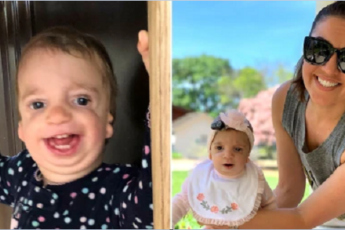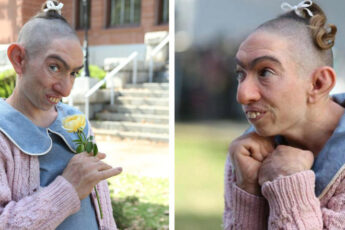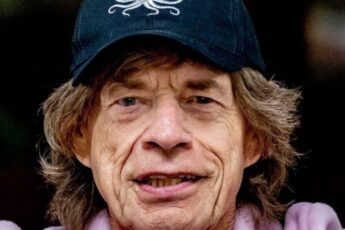After leaving the army, Steve struggled with loneliness and the consequences of numerous combat missions. The veteran has a new best friend. It is a blind and deaf dog. He spent almost 200 days in a Texas shelter before finding a home.
Steve grew up in Wisconsin and joined the National Guard in 1985. As the son of a Korean War veteran, he knew early on that he wanted to serve his country.
,,I think that’s always been my calling. I always played in the military as a kid. It’s something I’ve always wanted to do.” he says.
Members of the Guardia di Finanza usually work a civilian job or attend university part-time while continuing their military training. This balance between military and civilian life is an advantage that appeals to many, but Steve found it unsatisfying.
,,I didn’t get what I dreamed of, I wanted more.”
Steve made the military his full-time job in 1997. He joined active duty and served as a heavy anti-tank infantryman for ten years. Soldiers in this branch of professional soldiering (MOS) are responsible for attacking and destroying enemy tanks, armoured personnel carrier, locations and armament.
Steve loved his job and the bonds he formed with his comrades in arms.
INVISIBLE WAR WOUNDS
Working as an infantryman carries great risks, especially in times of conflict. Steve was deployed to the Middle East in 2003 in support of Operation Iraqi Freedom (OIF). There, he was wounded by an improvised explosive device (IED).
 Even today, war veterans struggle with traumatic brain injury (TBI) and post-traumatic stress disorder (PTSD). Unseen war injuries can have long-term effects on a person’s memory, mood and ability to concentrate. Other symptoms can include headaches, vision and hearing problems.
Even today, war veterans struggle with traumatic brain injury (TBI) and post-traumatic stress disorder (PTSD). Unseen war injuries can have long-term effects on a person’s memory, mood and ability to concentrate. Other symptoms can include headaches, vision and hearing problems.
Ironically, it was an injury unrelated to service that changed the direction of one soldier’s career.
After a 15-month tour of duty in Iraq, Steve was sent to Germany. When he wasn’t on duty, he liked to explore the country on his mountain bike. During a dangerous ride, he fell and was thrown from the bike, causing serious damage to his wrist.
Because of this injury, Steve could no longer serve properly as an infantryman. He followed the reclassification procedure and changed his MOS to Military Intelligence (MI).
The soldier was reluctant to leave the infantry unit but had no choice. Surprisingly, the job change was more pleasant than he had initially expected.
,,My time in the infantry gave me a good starting point for my military intelligence career.” he says. ,,It helped me understand what commanders in the field wanted and needed in terms of intelligence.”
AS A FATHER, AS A SON
After his transfer to the intelligence community, Steve continued to serve overseas. He eventually flew two more combat missions. But what he remembers most is a peacekeeping mission.
,,I worked in the Sinai Peninsula with a multinational force and observers. We were there to enforce the 1979 peace treaty between Egypt and Israel.” he recalls. ,,We made sure that the agreement between the two countries was not violated.”
While Steve’s career at IM was flourishing, things were going well on the home front. The soldier got married and eventually decided to start a family. In 2011, the couple completed the necessary paperwork and became approved foster parents.
Shortly after, Steve was sent to the Middle East for a six-month deployment. Much earlier than expected, the prospective parents were put in touch with a sibling.
,,My wife got a phone call while I was in Afghanistan. She became interested in them and I didn’t meet them until I came home.” he says.
At the time, Nathan was two and Cole was one. Nathan suffers from Coats disease, a rare retinal disorder, and has been blind in his left eye since birth.
 In addition, both biological siblings have been diagnosed with autism spectrum disorder (ASD). Children with ASD do not look different from their peers, but they often behave, communicate, interact and learn differently.
In addition, both biological siblings have been diagnosed with autism spectrum disorder (ASD). Children with ASD do not look different from their peers, but they often behave, communicate, interact and learn differently.
Steve lives with the lingering and invisible effects of TBI and PTSD and understands the special needs of his children.
Two years later, the couple officially adopted the children. Little did they know that a blind and deaf dog would soon become part of their special family.
A MAN OF HIS WORD
Steve retired in January 2020 after 13 years in the National Guard and 23 years on active duty. He traveled the world during his forty-year career. He finally settled in central Texas, an hour’s drive from his children and now ex-wife.
For many veterans, the transition from military to civilian life is a difficult one. Steve missed the camaraderie he shared with other soldiers. His sons live too far away for him to spend time with them every day.
The outbreak of the COVID-19 pandemic has exacerbated the new retiree’s sense of isolation. It has also made it harder to find work.
,,I had a really hard time when I left the army.” Steve recalls. ,,I needed someone to hang out with and do things with.”
The veteran thought of the many ways a pet could alleviate loneliness. Steve grew up with animals and adopted several dogs and cats throughout his marriage. He was ready to have a pet of his own.
But most importantly, Steve wanted to keep the deal he had made with Nathan and Cole, who are now 11 and 10 years old, respectively.
,,I promised the boys that one day I would get a dog and keep it at home so that when they came to visit, there would be something there.”
 PATIENCE IS A VIRTUE
PATIENCE IS A VIRTUE
Steve started looking for a four-legged friend online and eventually contacted an animal shelter near his home. He didn’t find ,,the one” that day, but he did take home a pet for a Patriots brochure.
The former intelligence analyst had read about our mission and work online. He was impressed by the many benefits our program offers veterans and pets.
,,There are many organizations to watch out for.” he said. ,,I realized this was not one of them.”
Steve admitted he was disappointed that he couldn’t find the right dog right away, but he was ready to take his time. The retired war veteran knew it was especially important to find a dog that would get along well with his two sons.
,,Finding the perfect dog or cat can take some time. You just have to take your time because you don’t need to rush.”
In the meantime, Steve found another thing to keep him diligent while he searched for a furry friend. A job.
REPAYMENT IS A BLESSING
Steve currently works as a contractor training military intelligence analysts in the use of MI computer systems. He is rediscovering the joy of working with soldiers and this job confirms something he learned years ago.
,,It took me a long time to realize what my passion was, but I finally understood why I joined.” he says. ,,My passion is helping soldiers, taking care of them, training them and leading them.”
Today, Steve realizes that the years he spent caring for others have rewarded him in unexpected ways.
,,My biggest reward is that even though I’m retired now, I still have soldiers coming to me for advice. They ask me how I’m doing. Some of them come to me and say I was too hard on them and now they know they need it and they thank me for it.”
Going back to work has helped Steve find a new rhythm in wrestling. It gave him the structure and social interaction he needed and reignited his passion for working with soldiers.
Still, at the end of the day, the army veteran wanted to go home alone.
,,MAN, THIS DOG WOULD BE PERFECT FOR US.”
Steve regularly checked local websites until a particular picture and profile caught his attention. He still vividly remembers that day as Veterans Day.
Ernie was born on a farm, deaf and nearly blind. The farm owner surrendered him to a shelter, fearing he couldn’t provide a safe environment for a puppy with such problems.
,,I read that he had special needs and I thought, ‘Oh my God, this dog would be perfect for us. My kids have special needs. I’m a little deaf and blind and I have special needs. I was looking forward to get to know him.”
At this moment, the Texas Humane Heroes cared for the one-year-old cattle mix. He was brought there after spending months at another shelter in Texas.
Since 2013, Texas Humane Heroes has offered half-price adoptions to veterans in our program at the Leander and Killeen shelters.
Steve spent time with Ernie at the shelter. They walked and played together. The search was over.
 The veteran discovered that Ernie had been homeless for nearly 200 days. That’s most of his very young life. He had been in and out of the Texas Humane Heroes shelter where he was transferred.
The veteran discovered that Ernie had been homeless for nearly 200 days. That’s most of his very young life. He had been in and out of the Texas Humane Heroes shelter where he was transferred.
,,He was very shy and it took him a while to make friends.” she recalls. ,,I always knew we fit in.”
A BLIND AND DEAF DOG IS A PERFECT FIGHTING PARTNER
Steve arranged a foster home for the disabled puppy when he applied to our program. When the veteran returned home, the first thing he had to do was give his new friend a name.
,,With my military background and the rank I had, I thought it would be appropriate to have a private I could give orders to.” he jokes.
Steve and Private were officially adopted in December 2020. At this time, Private had fully adjusted to his new home and they had found an innovative way to communicate together.
,,I snap my fingers when I want to get his attention and that usually works.” Steve explains. ,,Or if he’s near something I can touch, he responds to the vibrations.”
Private also has a great way of getting Steve’s attention.
,,He loves to be stroked. His favorite place is just under the chin, where the nose meets the neck. He loves to be stroked there.” says Private. ,,If I stop petting him, he wants more with his paws. It’s like he’s saying, How dare you stop?”
,,HE IS MY FRIEND”
Private has other good habits. He likes to find Steve’s shoes and throw them in the air. He gets up in the middle of the night to play. He does well on walks and easily overcomes fallen trees and logs. And then there’s the door.
,,For a blind dog, he really likes to look out the door.” Steve says.
But Private’s favorite thing seems to be riding in the car. So much so that Steve has to walk to Private’s right every time they leave the house to prevent him from walking towards the car.
,,He’s obsessed with sitting in the car with me.” he says. ,,He always wants to get in the car and go for a drive.”
Steve enjoys his wrestling partner’s quirks and wouldn’t change it for the world. The fact that Private is blind and deaf makes it even more perfect.
,,Private is my buddy.” he says. ,,He’s my buddy.”
,,LIKE A ROCK STAR.”
Steve gently led Nathan and Cole to Private. It took a while for the shy dog to befriend them, but the trio get on well.
,,They know he has special needs just like them. That’s how they form a special bond.” he says. ,,They know where to pet him and that they don’t have to go to him too quickly. They are very gentle with him and he is very gentle with them.”
The Army veteran recently returned to Texas Humane Heroes with his children and corporal. They had previously purchased pet supplies and toys to donate to the animal shelter. It was a fun day for everyone, including their blind and deaf dog.
,,He is there like a rock star. The staff loved him when he was there and they were so happy to see him again.” says Steve. ,,Everyone took pictures of him and sent them to their friends who weren’t working that day. The kids thought they were with a real rock star because Private was getting so much attention.”
For Steve, Private is much more than a rock star. The disabled cub is his rock. The formerly lonely veteran now appreciates the special companionship that a dog from the shelter can give him.
,,He is a source of joy and solace for me.” says the veteran. ,,He gave me that little companionship I needed.”
A NATURAL WAY TO REDUCE STRESS
Steve has dedicated much of his life to serving our nation. He has served multiple combat deployments and struggles with the lingering effects of TBI and PTSD. But his greatest accomplishment is being a devoted father to two children who have a very special canine sibling thanks to him.
 It seems appropriate that Steve adopts a blind and deaf dog. It takes an extraordinarily compassionate, patient and loving heart to decide to adopt an animal with lifelong problems. And Private knows this very well.
It seems appropriate that Steve adopts a blind and deaf dog. It takes an extraordinarily compassionate, patient and loving heart to decide to adopt an animal with lifelong problems. And Private knows this very well.
,,He’s a bit of an attention-seeker.” she says.
Steve encourages every solitary veterans to think about adopting a pet. But if adoption is not an option, visiting an animal shelter can also be very helpful.
,,Go to an animal shelter and visit the dogs or cats. It’s a great way to reduce stress and anxiety and you leave feeling good.” she says: ,,I would never buy a dog that didn’t come from an animal shelter.”








Wow, wonderful blog structure! How long have you ever been running a
blog for? you made blogging look easy. The full glance of your web
site is great, let alone the content! You can see similar here e-commerce